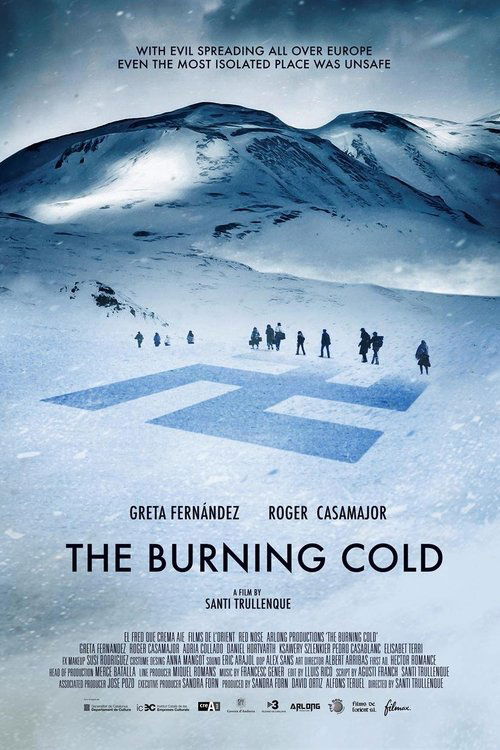The Burning Cold

Plot
In the small country of Andorra, nestled in the Pyrenees at the height of the winter of 1943, a sense of apprehension hung over the local inhabitants. The nearby war was not their concern; survival was. Antonio and Sara, a young married couple, were brimming with excitement as they anticipated the arrival of their first child. Their days were filled with the mundane tasks of preparing for the new addition, unaware of the turmoil that was about to disrupt their peaceful lives. The first sign of trouble came with the arrival of the Levin family, a group of Jews fleeing Nazi persecution. The family's desperation and fear was palpable, and the local population struggled to understand their situation. In this isolated mountain valley, where time seemed to stand still, the concept of war was an abstract notion that few comprehended. The reality of their world revolved around agriculture, family, and the hazy memories of distant wars fought by their forefathers. As the Levis settled into the small community, anticipation turned to anxiety. Suspicion and fear began to seep in, like cold wind through the crack of a wooden door. Sara, whose quiet resolve was about to be tested, was particularly unsettled. Antonio, ever the pragmatist, urged caution, and for the most part, their friends and fellow villagers followed suit. However, Sara, with a heart heavy with the weight of moral conflict, silently wrestled with her conscience. Unbeknownst to the local inhabitants, including the Levis, a dark past was hiding just beneath the surface of their tranquil community. Buried secrets, accumulated over the decades, threatened to surface with the arrival of the fleeing Jews. Antonio's paternal household, for instance, had ties to the old aristocracy and held true allegiance to the Spanish Bourbon monarch, who in theory had the highest regard for Jewish cultural importance. As Sara navigated the challenges inflicted upon their small town by the unpredictable journey of the Levis, the psychological strains on her began to emerge. Her hesitation stemmed from her mixed feelings of uncertainty towards the new arrivals and the people about to steal a piece of her identity: her baby. It was much easier for her to attribute an entire community to one assumption - especially given an already fearful environment. Sara's concern, ultimately a deep unease centered around Sara's family was an issue not seen so frequently in everyday discussions: the community's possible ties with what little is left with the Third Reich, and the seemingly all-out approach toward adopting Jewish refugees. Her fragile balancing act – as tensions continued to rise between the locals and the fleeing Jews – would reach a breaking point, and with it, a wave of irreversible understanding: forcing Sara to choose between what she had known all her life and what she believed to be inherently right. The 'burning cold' in the Pyrenees was no direct reference to the weather conditions, though the sub-zero temperatures bore down relentlessly like an immense weight. Rather, it represented the conflict of convictions within the souls of the Andorran people. Factions within their small society began taking sides, with sympathizers for the Levis springing up in unassuming bursts. This growing emotional impasse did little to alleviate the community's chronic unease, or for that matter Sara's internal torment, as she started questioning the purity of her birthplace and family – bringing the very core of her identity under siege. As snow obscured the footpaths and reduced daylight to mere hours, creating endless, isolated nights with the stench of truth hanging in the unsolved winter, Sara was at a crossroads. Lost, unsure, yet utterly exhausted by the unfolding turmoil, it would be these final days of frost that determined whether, in defiance of conventional wisdom and local values, Sarah would take that fateful step toward embracing compassion and defiance, or whether all she held dear would rest on cold, hard earth in secret.
Reviews
Recommendations




